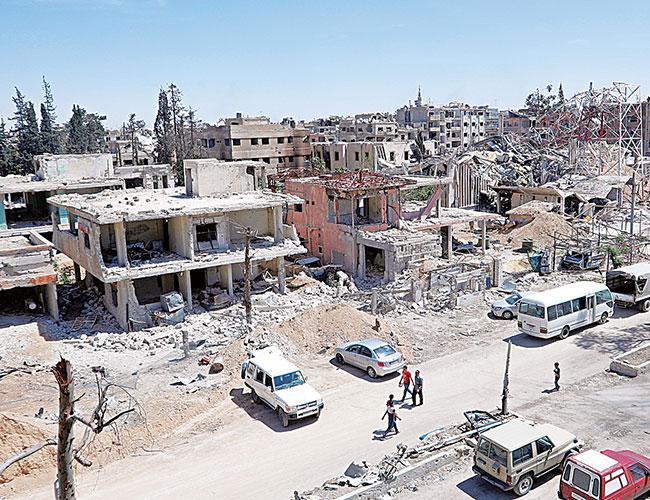
International investigators entered on April 17 a Syrian town hit by an alleged chemical attack, after days of delay and warnings by
Western powers that crucial evidence had likely been removed.
The suspected gas attack on April 7 on Douma, near Damascus, reportedly left more than 40 people dead and was blamed by Western powers on the regime of Syrian President Bashar al-Assad.
In response, the United States, France and Britain conducted unprecedented missile strikes on Syrian military installations, but Paris admitted on April 17 they were a matter of “honor” that had solved nothing.
“Experts from the chemical weapons committee enter the town of Douma,” state news agency SANA wrote, referring to the Organization for the Prohibition of Chemical Weapons (OPCW).
The inspectors arrived in Damascus on the day of the Western strikes but had not been allowed to enter Douma.
France and the United States appeared to question the purpose of such a mission, warning that any incriminating evidence had likely been removed by now.
“It is highly likely that evidence and essential elements disappear from the site, which is completely controlled by the Russian and Syrian armies,” the French foreign ministry said.
The U.S. ambassador to the OPCW, Ken Ward, had claimed April 16 that the Russians had already visited the site and “may have tampered with it.”
In an impassioned defense to the European Parliament on April 17, France’s President Emmanuel Macron admitted that the Aprdil 7 strikes had been a more political than military decision.
“Three countries have intervened, and let me be quite frank, quite honest - this is for the honor of the international community,” he said in the French city of Strasbourg.
The war of words continued to spiral between the Russian-backed Syria regime and the West but a military escalation looked to have been averted despite both sides trading threats after the strikes.
Yet, a report on state news agency SANA that Syrian air defenSes had shot down missiles over Homs province overnight raised fears that further action had indeed been taken.
It branded the incident an “aggression” but did not name a specific country.
Big explosions were heard overnight near Shayrat air base, southeast of Homs city, and near Damascus where two other air bases are located, the Syrian Observatory for Human Rights reported.
Later on April 17, however, SANA retracted the report, stressing there had been “no external attack” on Syria.
“Last night, a false alarm that Syrian air space had been penetrated triggered the blowing of air defense sirens and the firing of several missiles,” a military source told the agency.
Both the U.S. and Israel appeared to deny involvement in the overnight incident, which would have been the third time that Homs province was bombed in just over a week.